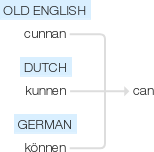Can
Old English cunnan ‘know’ (in Middle English ‘know how to’), related to Dutch kunnen and German können ; from an Indo-European root shared by Latin gnoscere ‘know’ and Greek gignōskein ‘know’.
wiktionary
From Middle English can, first and third person singular of connen, cunnen(“to be able, know how”), from Old English can(n), first and third person singular of cunnan(“to know how”), from Proto-Germanic *kunnaną, from Proto-Indo-European *ǵneh₃- (whence know). Compare West Frisian kinne, Dutch kunnen, Low German könen, German können, Danish and Norwegian Bokmål kunne, Swedish and Norwegian Nynorsk kunna, and Afrikaans kan. Doublet of con. See also: canny, cunning.
From Middle English canne, from Old English canne(“glass, container, cup, can”), from Proto-Germanic *kannǭ(“can, tankard, mug, cup”), perhaps from Proto-Indo-European *gan-, *gandʰ-(“a vessel”). Cognate with Scots can(“can”), West Frisian kanne(“a jug, pitcher”), Dutch kan(“pot, mug”), German Kanne(“can, tankard, mug”), Danish kande(“can, mug, a measure”), Swedish kanna(“can, tankard, mug”), Icelandic kanna(“a can”).
etymonline
can (v.1)
Old English 1st & 3rd person singular present indicative of cunnan "to know," less commonly as an auxiliary, "to have power to, to be able," (also "to have carnal knowledge"), from Proto-Germanic *kunnjanan "to be mentally able, to have learned" (source also of Old Norse kenna "to become acquainted, try," Old Frisian kanna "to recognize, admit, know," German kennen "to know," Middle Dutch kennen "to know," Gothic kannjan "to make known"), from PIE root *gno- "to know."
It holds now only the third sense of "to know," that of "to know how to do something" (as opposed to "to know as a fact" and "to be acquainted with" something or someone). Also used in the sense of may, denoting mere permission. An Old English preterite-present verb, its original past participle, couth, survived only in negation (see uncouth), but compare could. The present participle has spun off with a deflected sense as cunning.
can (n.)
generally, "a small cylindrical sheet-metal vessel used to contain liquids, preserves, etc.," Old English canne "a cup, container," from Proto-Germanic *kanna (source also of Old Saxon, Old Norse, Swedish kanna "a can, tankard, mug," also a unit of measure, Middle Dutch kanne, Dutch kan, Old High German channa, German Kanne). Probably an early borrowing from Late Latin canna "container, vessel," from Latin canna "reed," also "reed pipe, small boat;" but the sense evolution is difficult.
Modern sense of "air-tight vessel of tinned iron" is from 1867. Slang meaning "toilet" is c. 1900, said to be a shortening of piss-can; meaning "buttocks" is from c. 1910, perhaps extended from this.
can (v.2)
"to put up in cans," 1860, from can (n.1), especially "to put up in a sealed container for preservation." Sense of "to fire an employee" is from 1905. Related: Canned; canning.
